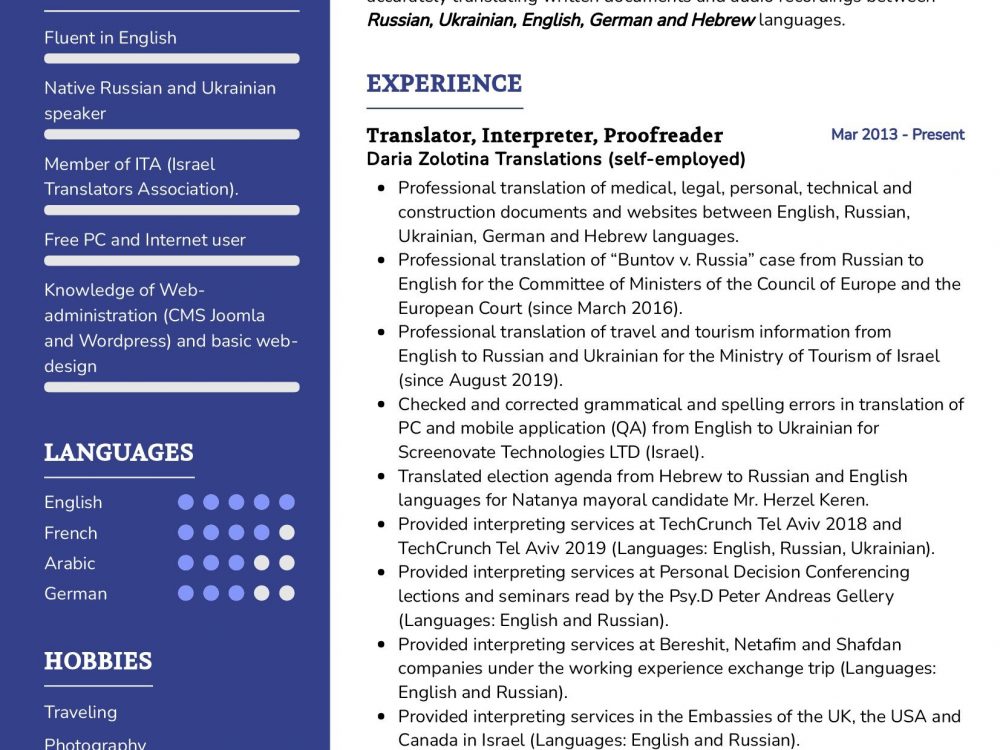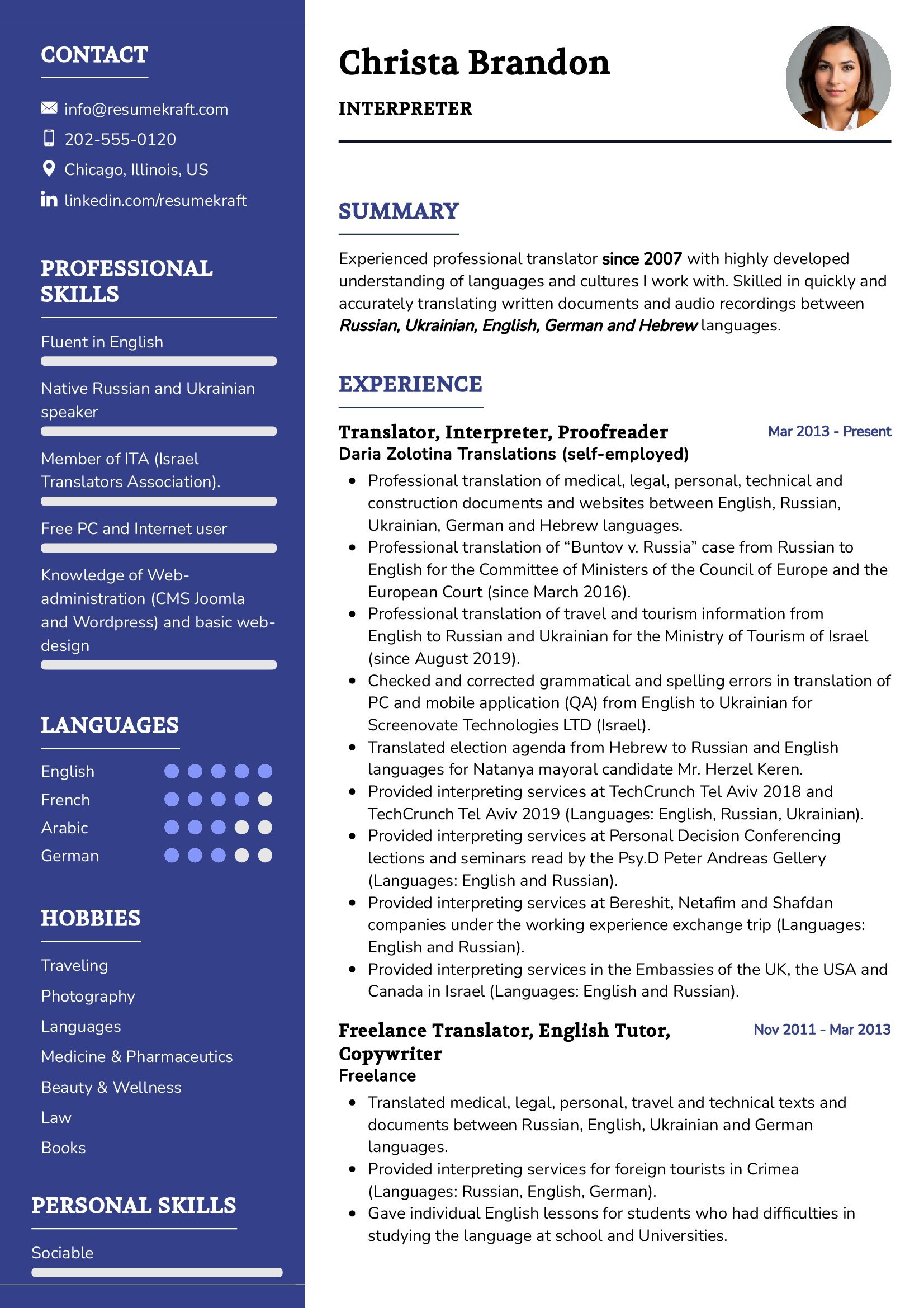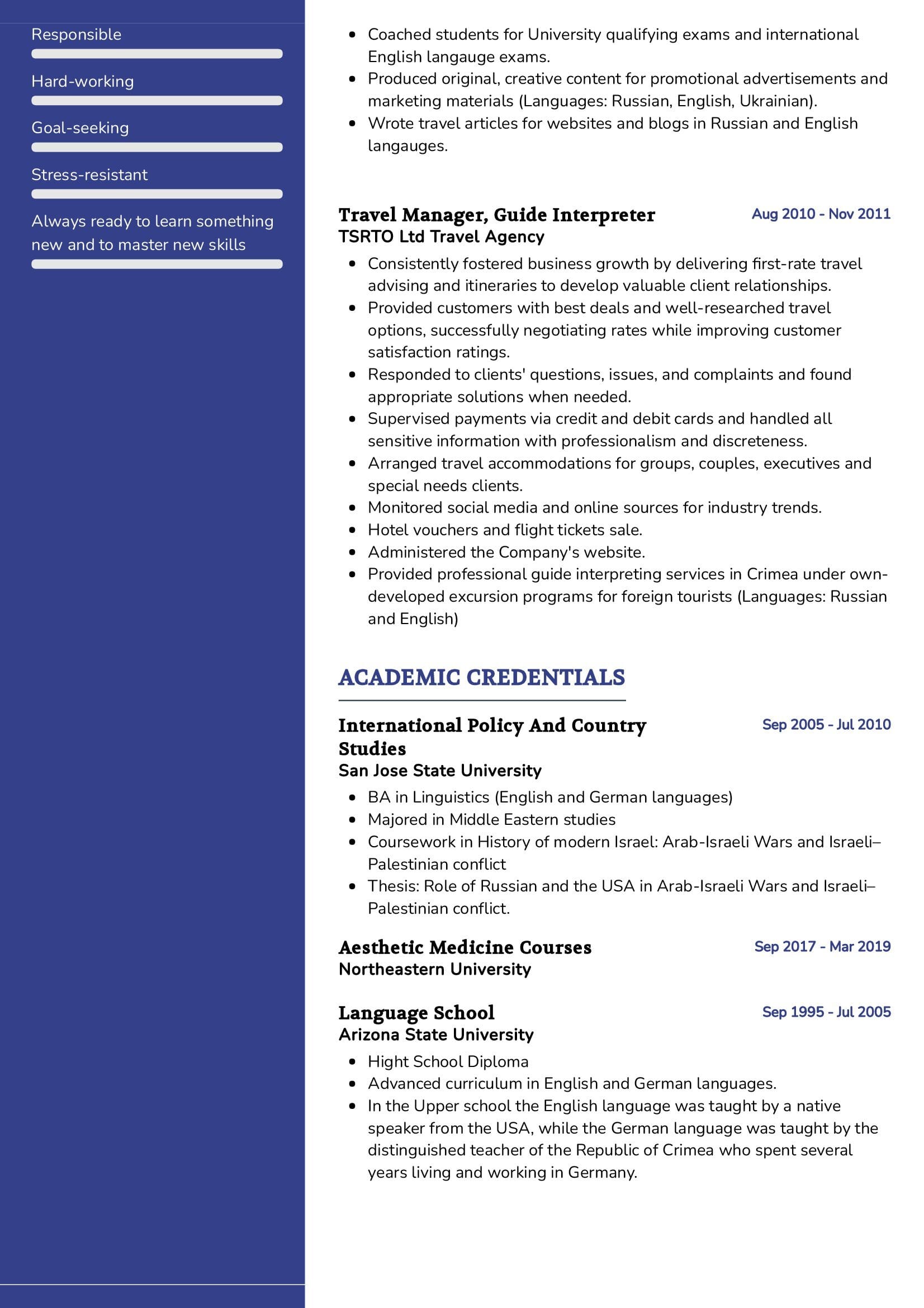Unlocking the Role of an Interpreter
In a world that celebrates diversity and global interconnectedness, the role of an Interpreter has never been more crucial. Interpreters act as linguistic bridges, facilitating communication between individuals who speak different languages. This article will delve into the multifaceted role of an Interpreter, the qualifications and skills required for this profession, and how to craft an impressive resume to secure your dream job as an Interpreter.
What Does an Interpreter Do?
The role of an Interpreter is both intricate and essential. Interpreters are language experts who enable communication between people who do not share a common language. They work in various settings, including but not limited to:
- Legal Proceedings: In courtrooms, interpreters ensure that individuals understand their rights and can effectively communicate with lawyers, judges, and other legal professionals.
- Medical Settings: In hospitals and clinics, interpreters help patients and healthcare providers understand each other, ensuring accurate diagnoses and treatment plans.
- Business Meetings: In international business settings, interpreters facilitate discussions, negotiations, and collaborations between companies from different linguistic backgrounds.
- Government and Diplomacy: Interpreters play a crucial role in diplomacy, enabling communication between representatives of different countries and international organizations.
- Community Interpreting: They assist in community events, social services, and educational settings, ensuring that non-English speakers have access to essential services.
The duties of an Interpreter go beyond mere translation; they must convey cultural nuances, tone, and context to ensure effective communication.
Interpreter Job Requirements
Becoming an Interpreter is a journey that requires specific qualifications and skills. Here are the prerequisites to embrace this profession:
- A Bachelor’s degree in linguistics, language studies, or a related field, showcasing a strong foundation in language and communication.
- Fluency in at least two languages, including the source language (the language being interpreted) and the target language (the language into which the interpretation is done).
- Deep cultural understanding of both languages, as language is deeply intertwined with culture.
- Excellent listening and speaking skills, allowing interpreters to convey messages accurately and clearly.
- Interpreting training and certification, demonstrating proficiency in the art of interpretation.
- Adaptability and composure, as interpreters often work in high-pressure situations where accuracy is paramount.
Securing additional certifications, such as those for medical or legal interpretation, can enhance your profile and expand your job opportunities.
Responsibilities of an Interpreter
The responsibilities of an Interpreter are as diverse as the settings in which they work. Here are some core duties that define this role:
- Conducting accurate and impartial interpretation, ensuring that the message is faithfully conveyed between parties.
- Adhering to a strict code of ethics and confidentiality, as interpreters often deal with sensitive information.
- Preparing for interpretation assignments by researching terminology and understanding the subject matter.
- Managing communication flow in multilingual settings, ensuring everyone has the opportunity to speak and be heard.
- Clarifying any misunderstandings or ambiguities that may arise during interpretation.
- Remaining neutral and unbiased, even in emotionally charged situations.
Interpreters play a vital role in promoting effective communication and breaking down language barriers in various fields.
Interpreter Resume Writing Tips
Your resume is your passport to the world of interpreting, and it should reflect your expertise and dedication to the craft. Here are some tips to create a compelling Interpreter resume:
- Highlight your language proficiency by listing all the languages you are fluent in.
- Showcase your interpreting experience in different settings, such as legal, medical, or business.
- Include specific examples of challenging interpreting assignments you have successfully handled.
- Emphasize your cultural knowledge, as understanding cultural context is crucial for accurate interpretation.
- Detail any relevant certifications or specialized training you have received.
Your resume should paint a picture of your linguistic prowess, your ability to facilitate communication, and your commitment to ethical standards.
Interpreter Resume Summary Examples
Your resume summary is your opportunity to make a strong first impression. Here are some examples that capture the essence of a skilled Interpreter:
- “Fluent in English and Spanish, with 5 years of experience in legal interpretation. Committed to upholding confidentiality and delivering accurate interpretations in high-pressure courtroom settings.”
- “Seasoned medical interpreter with a background in nursing. Proficient in English, French, and Mandarin. Dedicated to ensuring effective communication between healthcare providers and non-English-speaking patients.”
- “Experienced business interpreter fluent in Japanese and English. Facilitated successful international negotiations and cross-cultural collaborations for Fortune 500 companies.”
Your resume summary should be a glimpse of your language skills and your ability to bridge communication gaps.
Create a Strong Experience Section for Your Interpreter Resume
Your experience section is the core of your resume, where you narrate your journey as an Interpreter. Here are some examples to guide you:
- “Served as the lead interpreter for the United Nations General Assembly, facilitating diplomatic discussions between representatives of 193 member states.”
- “Provided simultaneous interpretation in high-profile court cases, including criminal trials and civil litigation, ensuring that all parties understood proceedings.”
- “Interpreted for a medical mission in rural Africa, bridging the language gap between healthcare professionals and local communities.”
Your experience section should showcase your versatility and the impact you’ve made in various contexts.
Education and Training for Interpreters
Your educational background and training are essential components of your resume. Here’s how you can list them:
- Master of Arts in Translation and Interpretation, XYZ University, 2015.
- Bachelor of Arts in Linguistics, ABC University, 2012.
- Certified Legal Interpreter, American Council on the Teaching of Foreign Languages (ACTFL), 2016.
Your educational qualifications and certifications are a testament to your dedication to the field of interpretation.
Interpreter Skills for Your Resume
As an Interpreter, your skills go beyond language proficiency. Here are some essential skills to include on your resume:
Soft Skills:
- Effective communication skills, enabling clear and accurate interpretation.
- Cultural sensitivity, crucial for understanding and conveying cultural nuances.
- Adaptability, as interpreters must quickly adjust to different contexts and subjects.
- Confidentiality and professionalism, to maintain the trust of clients and colleagues.
Hard Skills:
- Fluency in multiple languages, with a focus on source and target languages.
- Specialized knowledge in fields like law, medicine, or business, depending on your areas of expertise.
- Use of interpretation equipment and software for remote or simultaneous interpretation.
Your skills as an Interpreter encompass both linguistic proficiency and the ability to navigate complex cross-cultural situations.
Common Mistakes to Avoid in Your Interpreter Resume
As you craft your Interpreter resume, steer clear of common mistakes that can undermine your application:
- Avoid exaggerating your language proficiency; be honest about your abilities.
- Don’t neglect to mention relevant certifications or training; they add credibility to your resume.
- Avoid using jargon or technical terms that may not be understood by non-experts.
- Proofread meticulously to eliminate spelling or grammatical errors that could create a negative impression.
Your resume should be a reflection of your professionalism and precision, essential qualities for an Interpreter.
Key Takeaways for Your Interpreter Resume
As you strive to create an outstanding Interpreter resume, remember these key takeaways:
- Highlight your language proficiency, cultural knowledge, and ethical standards.
- Showcase your versatility by detailing your experience in various interpreting settings.
- Emphasize the impact you’ve made and the challenges you’ve overcome in your career.
- Include your educational qualifications and certifications to bolster your credibility.
Your resume should be a testament to your ability to bridge language barriers and facilitate effective communication.
Ready to take the next step in your interpreting career? Craft a compelling resume that opens doors to exciting opportunities. Don’t forget to utilize resources like AI Resume Builder, Resume Design, Resume Samples, Resume Examples, Resume Skills, Resume Help, Resume Synonyms, and Job Responsibilities to create a standout application and prepare for the Interpreter job interview.
Take the first step towards your dream job by crafting a resume that truly represents your linguistic talents and professionalism. Best of luck!



